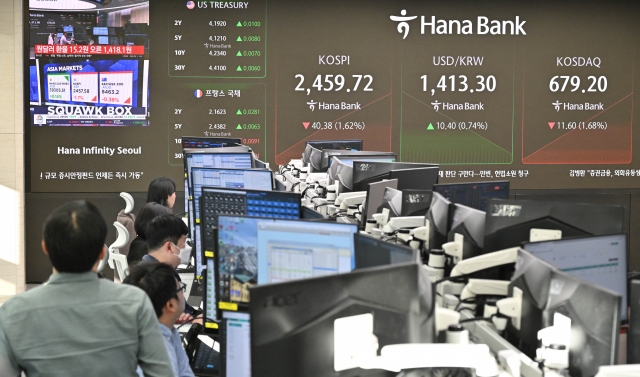Political crisis jolts Korean market but recovery shows resilience
 A dealing room at Hana Bank in central Seoul (Yonhap)
A dealing room at Hana Bank in central Seoul (Yonhap)
South Korea’s financial markets avoided a feared meltdown on Wednesday, recovering quickly after President Yoon Suk Yeol declared -- and just six hours later lifted -- martial law in response to political tensions.
Swift intervention from the National Assembly and financial authorities helped calm the initial panic, but questions about political stability continue to weigh on investors.
The benchmark Kospi index plunged as much as 2.31 percent during morning trading, bottoming out at 2,442.46 points before rebounding slightly by mid-afternoon. While the recovery trimmed losses, the index still ended the day nearly 2 percent lower.
The Korean won also faced significant volatility, initially weakening to 1,446 won against the US dollar before strengthening to around 1,415 won by the afternoon.
The overnight events marked the first declaration of martial law in South Korea in 45 years, sparking fears of market chaos. However, the rapid resolution prevented more serious damage to investor sentiment.
Foreign investors still selling
Foreign investors, already pulling out of Korean markets in recent weeks, were net sellers of approximately 300 billion won (about $212 million) in the securities market on Wednesday. This follows heavy net outflows of 750 billion won and 490 billion won on Nov. 29 and 28, respectively.
Retail investors stepped in as buyers, purchasing nearly 300 billion won in Kospi-listed stocks, while domestic institutions also added support by buying shares across both the Kospi and the tech-heavy Kosdaq indices.
“Given the unprecedented situation, the markets have shown considerable resilience,” said Na Jeong-hwan, an analyst at NH Investment & Securities.
Kospi 200 futures traded in New York initially plunged but pared losses after the martial law reversal, ultimately ending 1.8 percent lower.
Government steps in
To reassure investors, Finance Minister Choi Sang-mok held an emergency meeting on Wednesday morning and promised “unlimited liquidity” to stabilize the country’s financial system. He said the government would closely monitor markets in real time and take swift action if needed to restore stability.
This response from the government helped restore some calm after the initial shock.
Political uncertainty shadows recovery
While the quick lifting of martial law averted a deeper market sell-off, experts caution that the underlying political instability remains a significant concern.
A report from Hana Securities Research Center published Wednesday warned that heightened volatility could deter both domestic and foreign investors in the near term.
“Even though martial law was lifted, the political uncertainty could drive more investors to pull out of stocks and funds,” the report said, adding that South Korea’s relative lack of market liquidity could amplify any potential declines.
Foreign investors, already retreating from Korean assets, may remain cautious. Analysts worry that this incident, coupled with broader global concerns, could reinforce the “Sell Korea” trend seen in recent months.
However, experts note that the market’s fundamentals remain intact. “This is not a structural issue for the Korean stock market,” said researcher Na, suggesting that investors might still find opportunities to buy during dips.




